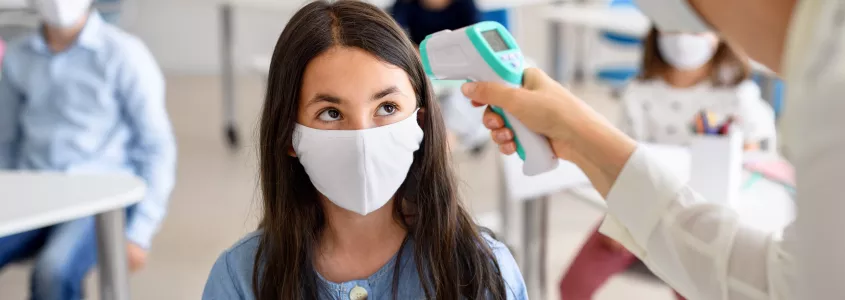
Table of contents
Currently, in most areas of Spain there is community transmission of the virus, which generates great concern among parents who fear that their children could be infected with Covid 19 in the classroom. On the other hand, specialists insist on the convenience of face-to-face education, not only because this way knowledge is better assimilated, but also because of the benefit for children of establishing social links with their peers. Despite this, many parents are afraid to take their children to school even though the authorities have already informed them that face-to-face education is compulsory and that parents cannot simply refuse to send their children to school. At this point, the question that is spreading among the population arises: What happens if I don't take my children to school? Here we explain it to you.
How is truancy regulated in the Law?
Education is a right and, as such, is recognised in Article 27 of the Spanish Constitution. In order to protect the right to a basic education in our country, it is compulsory from the age of six to sixteen. In general, parents who do not take their children to school and encourage truancy may incur a crime for breach of the duties inherent to parental authority, as regulated in Article 226 of the Penal Code. Another of the consequences of absenteeism is the declaration of the minor's abandonment, as regulated in article 172.1.II of the Civil Code, the immediate consequence of which is that the guardianship of the minor is assumed by the administration responsible for the protection of minors.
What happens in the case of absenteeism due to Covid?
There is no doubt that we are currently in an extraordinary situation. The Covid-19 epidemic is still ongoing, with a significant number of cases in certain communities. The increase in the number of cases in Madrid means that we can expect an increase in absenteeism from school in the Community of Madrid, where many parents are reluctant to take their children to school. In this case we are faced with a conflict between the child's right to health (which parents want to protect), and the child's right to education (whose attendance at school is compulsory). However, this preventive absenteeism must be analysed from the perspective of the social reality in which we currently find ourselves, as established in article 3 of the Civil Code, in which case it is worth considering whether preventive absenteeism due to fear of the virus is justified. In order to make a correct assessment of the facts and control school absenteeism, the Office of the Public Prosecutor for Minors has issued service note 1/2020, of 4 September (SP/DOCT/106789), which unifies the criteria of public prosecutors for minors in cases of absenteeism due to parents' fear of their children becoming infected, as set out below:
Criteria of the Office of the Public Prosecutor for Minors in cases of absenteeism due to Covid
• Attendance of the pupil at the school is compulsory.
• Schools must follow the safety protocols established by the health authorities and strictly comply with the general system of occupational hazards and Covid-19.
• Only in the case of persistent, voluntary and unjustified neglect by parents of their children will it be considered a case of non-compliance with the duties inherent to parental authority.
• Only when the educational centre detects such persistent non-compliance will it inform the Absenteeism Commission and an administrative file will be opened.
• Only if the absenteeism is not justified, the copy of the administrative file shall be sent to the Public Prosecutor's Office. In any case, the Public Prosecutor shall analyse the specific circumstances of each case before initiating criminal proceedings.
On the basis of the provisions of the Criminal Code and the note issued by the Juvenile Prosecutor's Office, we can conclude that in the case of parents who do not take their children to school for fear of Covid, there is no crime, since we are not in the case of absenteeism as provided for in the Criminal Code. The existence of the offence only occurs when parents behave with indifference to their obligations towards their children, which is not the case when parents simply want to preserve their children's health. In this sense, the provisions of Article 20 of the PC would apply, according to which "anyone who acts in the performance of a duty or in the legitimate exercise of a right, office or position" is exempt from criminal liability.
Another question that arises is whether absenteeism due to fear of Covid could be considered sufficient grounds for declaring the child unaccompanied and opening an administrative file through which the guardianship of the child could be taken over by the administration responsible for the protection of minors. In this sense, it seems very unlikely that the lack of school attendance due to the parents' fear of the epidemic could be, by itself, sufficient to declare the child unaccompanied and initiate the administrative procedure to withdraw the parents' guardianship, given that case law requires the concurrence of other serious facts, in addition to absenteeism, in order to declare the child unaccompanied.
In short, the lack of attendance at school is not in itself sufficient grounds for the parents to commit a criminal offence, nor is it sufficient grounds to declare the child unaccompanied. As pointed out in its note, the parents' neglect of the child must be persistent over time, voluntary and unjustified. Furthermore, each case must be analysed taking into account the specific circumstances of the case and the evidence that can be provided in each case in defence of the legitimate rights of the children and their parents.

"Anywhere in Spain"
With our online appointment system you will have immediate advice without the need for face-to-face visits or travel.
One of our lawyers specialized in your area of interest will contact you to formalize an appointment and make your consultation by video call.

Add new comment